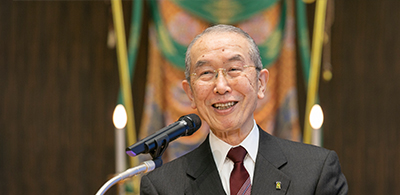Keeping the Precepts Is a Token of Your Gratitude
April 2022

Gratitude for the Support We Receive
As I often say, our lives are always being supported by all existence from the moment we are born. However, when it comes to being grateful for that support each and every day, there may be few people who can confidently say that they do. Some people complain about the weather, while others seem incapable of uttering a simple “thanks” to their own family members.
Precept keeping is one of the Six Paramitas, which teach us the virtues of our bodhisattva practices. The original term for “precept keeping” is sīla, (Pali; Sanskrit, śīla), which means “to perfect good habits.” While the term “precept keeping” may give a rather prohibitive “you-must-not” impression, it really has a positive meaning, appropriate for the practices of bodhisattvas who hope for the happiness of both themselves and others.
This positive meaning has a profound connection to the Buddhist teaching that I mentioned above, “Our lives are always being supported by all existence,” which conveys the essence of Buddhist teaching. We are grateful that everything is supporting our lives and therefore we strive, in accordance with the wish of the Buddha and the goal of the bodhisattva, to help everyone lead pleasant, happy lives. After all, giving peace of mind to the people around us, wherever we are right now, is the least we can do as a token of our gratitude for that support. It is the law of nature that everything in every place inherently exists in a state of harmony, so by mastering and putting into practice habits that make everyone feel peaceful and pleasant, you are expressing your own feelings of gratitude for being caused to live, which is the meaning of the bodhisattva practice called “precept keeping.”
There are five precepts for lay Buddhists, which are to abstain from taking life, stealing, immoral sexual conduct, telling lies, and consuming intoxicants. From our point of view, though, we could say that these five are guidelines against causing trouble to or hurting other people. When you have respect for all life and put it to good use; get along well with family, friends, and acquaintances; and let everyone live happily──that’s the greatest joy for you, too, isn’t it?
We Should All Make Our Own Personal Precepts
Masahiro Mori, an authority on robotics with a deep knowledge of Buddhism, said that just as every person’s face is different, “Everyone has their own particular habits and weaknesses and therefore, the precepts should be different from one person to the next.” In other words, it is important to find and put into practice your own “custom-made” good habits and make them your own personal precepts.
In that sense, let’s consider good habits, including the five precepts, that we think are necessary for ourselves. For example, if you are someone who tends to annoy other people by frequently being late, it might be helpful to recall Founder Niwano’s habit of always saying, “Arrive early, even if only five or ten minutes ahead of time.” Or if you are someone who is quick to express anger, I think that the habit of reciting, at such times, the mantra, on nikoniko, hara tatsumaizoya sowaka (“smile and do not lose your temper, may it be so”), and taking a deep breath may help you restrain yourself from making the people around you uncomfortable.
“Precepts” like these that differ from person to person—which we could say, depending on the point of view, are lifestyle rules or manners—are different from “manners” (in the usual sense) because, in the mind of each and every person who puts them into practice, there is gratitude for receiving support and the hope and prayers for the happiness and harmony of everyone. Your mind of benefitting others, which brings harmony to your surroundings, becomes the diligence of a bodhisattva and leads to your own experience of the joy of benefitting yourself.
In snowy regions of Japan, spring is said to come forth from the roots of the trees. There is a Japanese phrase, yukinebiraki, that describes how the snow around the roots of trees starts melting before anywhere else around it. Indeed, when I recall spring in Founder Niwano’s hometown, Suganuma, my mind wanders back to serene memories of the tutelary shrine’s cherry trees, their trunks peeking through the soil while the area around them was still covered in snow, starting to bloom brightly.
With gratitude for the workings of the gods and the buddhas, we must continue to master skills so that we live in harmony with the law of nature and pass our days with peace of mind.




